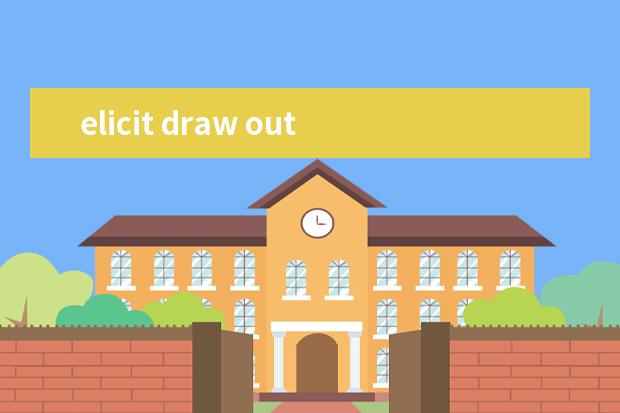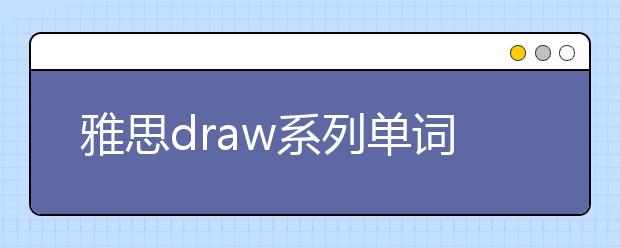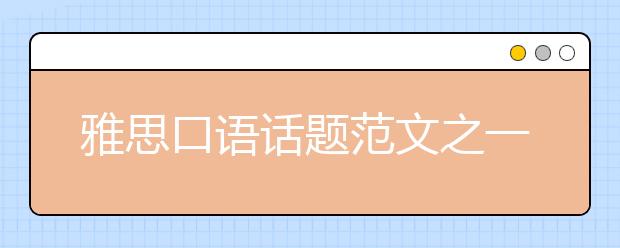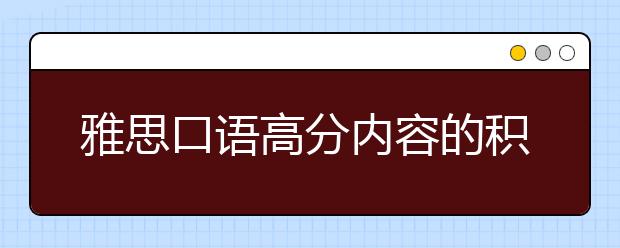雅思考试主要是通过对考生听、说、读、写四个方面英语能力的考核,综合测评考生的英语沟通运用能力,实现“沟通为本”的考试理念。对于雅思考生来说,也有很多考试难点和政策盲区需要帮助解答。今天雅思无忧网小编准备了elicit draw out , draw up , draw off是什么意思? - 百度...,希望通过文章来解决雅思考生这方面的疑难问题,敬请关注。

elicitability是什么意思
一般很少见这种说法..如绝败悄果确定没问题的话 可以这么理解
elicit vt.引出;诱出;探出
后面加ability一般代表 ...性 比如可枯信塑性等等
这两个连起来翻并渣译的话 应该是类似于 可探性 的意思
induce同义词
“nduceI”是一个常见的英语单词,表示“引起”、山纤简“诱导”、“导致”等含义。在英语中,有很多与“induce”意思相近的词语,下面将介绍几个常用的同义词以及它们的具体含义和用法。
“Stimulate”是指通过*或激励某些因素,来引起或促进某种行为或反应。它通常用于描述对人或动物的生理、心理或行为的影响。例如:
Bright colors can stimulate the appetite and make food more appealing.
鲜艳的颜色可以*食欲,使食物更加美味。
Trigger”是指引起某种行为或反应的因素或事件。它通常竖姿用于描述引起负面情绪或行为的因素。例如:
Certain sounds can trigger anxiety or panic attacks in some people.
某些声音可以引起某些人的焦虑或惊恐反应。
“Elicit”是指通过提问、调查或其他方式,引出某种反应或信息。它通常用于描述获取信息或引起某种反应的方式逗裤。例如:
The survey was designed to elicit opinions and feedback from customers.
该调查旨在从客户那里获取意见和反馈。
draw out , draw up , draw off是什么意思? - 百度...
draw out , draw up , draw off的意思分别是:
1、draw out 拉长, 拖长, 扩展 掏出, 取出 ;提取(存款) ;榨出, 抽出, 提炼出 ;召集; 使排好队; 派出 草拟, 拟出; 逗引...说话; 诱使吐露丛磨真情 ;(白昼)长起来 ;(火车)开出(车站); (船)驶离(停泊处); (汽车)驶出 ;在前面拉开距离。
2、draw up 写出; 草拟, 制订; (车、马等)停住; 使(车、马等)停住; 曳上, 拉起(鱼网等) ;逼近(to), 追上(with) ;【军】整(队); 把...拉过来 ;吸收; 消散, 驱散。
3、draw off 排出, 放掉(水等) ;脱去(手套等); 消除(痛等) ;转移(别人注意力等) ;撤退(军队等)。
扩展资料:
“draw out , draw up , draw off”的近义词及组句:
1、draw out的近义词: work out, elicit, exsert, reel off, shoot out, take out, whop, hollow out, pull out、 draw forth, educe, elicit, lead to, derivation
组句:He heated the mental and drew it out into a long wire.他将那金属烧热,并把它拉成一根长的金属丝。
2、draw up的近义词: 逼近approach,gain on,整队line up,编造make up。
组句:The lawyer has drawn up the agreement.律渗运斗师制定了协议书。
3、 draw off的悄悄近义词: remove (a commodity) from (a supply source).
组句:Now draw some off, he ordered, and take it to the steward of the feast and they did so耶稣吩咐道:现在舀出来给管宴席的送去。他们照耶稣的吩咐做了。
参考资料来源:
百度百科-Draw
新概念英语第一册练习册第139—140课的答案 - 百度...
有点乱 没办誉禅法庆世尘 百度这个 没法编辑字体 有文档 发给你也可返胡以
Lesson 139
Content and basic aims
PATTERNS AND STRUCTURAL WORDS VOCABULARY
Tell (me) if/why... Nouns Adjectives Expressions
He wants to know if/why/what/when...
I don't know what...
company
help
line
engineering
extra
overseas
Speaking.
by the way
General remarks
* Try as far as possible to conduct the lesson in English.
* Indirect questions involving the use of if and question words will
be practised in this lesson.
Listening Comprehension
1 Introduce the story
T: Today we'll listen to a story about mistaken identity.
2 Understand the situation
Ask the students to interpret the picture.
3 Listening objective
T: Listen to the story and see if you can answer this question: Which
John Smith does Graham Turner think he is talking to? 4 Play the tape or
read the dialogue
5 Answer the question
After the reading, ask the question: Which John Smith does Graham Turner
think he is talking to? Answer: John Smith from the Overseas Engineering
Company.
6 Intensive reading
Play the tape or read the dialogue again, pausing after every line to
check the students understand.
7 Play the tape or read the dialogue again
Play the tape or read the dialogue right through again. The students
listen only.
8 Repetition
Play the tape or read the dialogue again, pausing after every line,
and ask the students to repeat (a) in chorus, (b) in *all groups, and (c)
individually.
9 Reading aloud
Ask one or two students to take parts and to read the dialogue aloud.
Comprehension
* Ask individual students questions.
1 T: Isn't Graham Turner speaking to John Smith?
S: Yes, he is. 2 T: What does Graham Turner ask John Smith to tell Mary?
S: He asks John Smith to tell Mary they willbe late for dinner this
evening.
3 T: What time did he say he would be at their house?
S: He said he'd be there at six.
4 T: Why does he say he'll be late?
S: Because the boss wants him to do some extra work.
5 T: When will he finish?
S: He doesn't know when he will finish.
6 T: What does the speaker's wife want to know?
S: She wants to know if Mary needs any help.
Asking questions
1 T: Ask me if John understands.
S: Does John understand?
T: Why doesn't ...?
S: Why doesn't John understand?
2 T: Ask me if Mary invited them to dinner.
S: Did Mary invite them to dinner?
T: Who ... ?
S: Who invited them to dinner?
3 T: Ask me if Graham will have to stay at the office.
S: Will Graham have to stay at the office?
T: Why...?
S: Why will Graham have to stay at the office?
7 T: What doesn't John Smith understand?
S: He doesn't understand what the speaker is talking about.
8 T: Is he John Smith, the engineer?
S: Yes, he is.
9 T: Is he from the Overseas Engineering Company?
S: No, he isn't. He's from the telephone company.
4 T: Ask me if John knows what Graham is talking about.
S: Does John know what Graham is talking about?
T: Why doesn't ... ?
S: Why doesn't John know what Graham is talking about?
5 T: Ask me if John works for the Overseas Engineering Company.
S: Does John work for the Overseas Engineering Company?
T: Who ... for ?
S: Who does John work for?Pattern drill: Books shut
(a) To elicit echoed questions: affirmative and negative.
T: Mr. Turner isn't speaking to Tom Brown.
S: Isn't he? etc.
(b) To elicit question tags : affirmative/negative;
negative/affirmative.
T: Mr. Turner isn't speaking to Tom Brown. S: Mr. Turner isn't speaking to Tom Brown, is he? etc.
(c) To elicit tag rejoinders expressing agreement :
affirmative/negative; negative/affirmative.
T: Mr. Turner isn't speaking to Tom Brown.
S: He isn't, is he. etc.
Tell the story
Ask individual students to look at the pictures and Tell the story.
Lesson 140
Spelling drill: Books shut.
Ask the students to spell the following words:
month/mumps; come/jump; dust/front; Dutch/other; stomach/lunch;
tongue/lucky; mum/son; London/hurry.
Repetition drill
(a) Chorus repetition
To elicit indirect questions involving the use of if and question words.
* Give the instructions Lesson 140. Do not open your book. Listen. Do
not speak.
* Play the examples on the tape.
( 1 ) T: Are you tired?
What does he want to know?
S: He wants to know if you are tired.
(2) T: Why is Mary late?
What does she want to know?
S: She wants to know why Mary is late.
(3) T: Does Tom get up early?
What does he want to know?
S: He wants to know if Tom gets up early.
T: Now you answer the questions. Ready?
1 As in (1) above.
2 As in (2) above.
3 As in (3) above.
4 T: Is Tom doing his homework?
What does she want to know?
S: She wants to know if Tom is doing his homework.
5 T: What are you cooking?
What does he want to know?
S: He wants to know what you are cooking.
6 T: When does Tom arrive?
What does she want to know?
S: She wants to know when Tom arrives.
7 T: Will the children go to bed early?
What does he want to know?
S: He wants to know if the children will go to bed early.
8 T: When will you have a bath?
What does she want to know?
S: She wants to know when you'll have a bath.
9 T: Did Tom go to bed early?
What does he want to know?
S: He wants to know if Tom went to bed early.
10 T: When did Tom go to bed?What does she want to know?
S: She wants to know when Tom went to bed.
(b) Group or individual repetition
* Ask *all groups or individual students to repeat the questions and
answers.Pattern drill: Books shut
* Illustrate each exercise first by providing the stimulus and the
response.
* Then, with the instruction Now you!, ask individual students to continue
in the same way.
(a) To elicit: He wants to know if you are (tired).
T: Are you tired?
S1 : What does he want to know?
S2 : He wants to know if you are tired. etc.
Substitute the following adjectives:
cold; wet; busy; thirsty; hungry; late; early; lazy; dirty.
(b) To elicit: Tell me if you are (tired).
T: Are you tired?
S: Tell me if you are tired. etc.
Substitute adjectives in (a).
(c) To elicit: He wants to know why you are (tired).
T: Why are you tired?
S1 : What does he want to know?
S2 : He wants to know why you are tired. etc.
Substitute appropriate adjectives.
(d) To elicit: Tell me why you are (tired).
T: Why are you tired?
S: Tell me why you are tired, etc.
Substitute appropriate adjectives.
(e) To elicit: He wants to know if you are (reading).
T: Are you reading?
S1 : What does he want to know?
S2 : He wants to know if you are reading. etc.
Substitute the following:
writing; buying books; cooking; typing; playing; painting.
(f) To elicit: He wants to know what you are (reading).
T: What are you reading?
S1 : What does he want to know?
S2 : He wants to know what you are reading, etc.
Substitute the verbs given in (e) above.
(g) To elicit: He wants to know if Tom (goes to bed early).
T: Does Tom go to bed early?
S1 : What does he want to know?
S2 : He wants to know if Tom goes to bed early. etc.
Substitute the following:travels abroad; returns early; gets up early; does his homework; arrives
late; shaves every morning; has a bath every day.
(h) To elicit: He wants to know when Tom (goes to bed).
T: When does Tom go to bed?
S1 : What does he want to know?
S2 : He wants to know when Tom goes to bed. etc.
Substitute the expressions given in (g).
elicit什么意思
一、elicit的意思为:
引出,探出,诱出。
二、记忆技巧:
e 出 + lic 引诱 + it → 引诱出 → 得源答出。
三、例句:
1、Mr Norris said he was hopeful that his request would elicit a positive response ——诺里斯先生说希望他的请求能够引起积极反响。
2、Phone calls elicited no further information. ——几个*都没有打听到进一步的消碧旁息。
扩展资料
词根:
1、= to be allowed,to be permitted 被允许,被批准。
illicit adj. 不合法的。
il 不 + lic 被允许,被批准 + it → 不合法的。
licence n. 特许;许可证。
lic 被允许,被批准 + ence 表状态 → 特许;许可证。
2、= to allure,雹慧慧to entice 引诱。
delicate adj. 精致的。
de 加强 + lic 引诱 + ate 具有…的 → 非常引诱人的 → 精致的。
delicacy n. 精致。
de 加强 + lic 引诱 + acy 表状态,delicate的名词 → 精致。
以上就是雅思无忧网为您准备的elicit draw out , draw up , draw off是什么意思? - 百度...全部内容。访问雅思无忧网(https://www.yasi.cn/),了解更多雅思考试新消息,新动态。
雅思培训
免责声明:文章内容来自网络,如有侵权请及时联系删除。


 雅思draw系列单词
雅思draw系列单词
 每日雅思词汇:draw系列单词
每日雅思词汇:draw系列单词
 雅思口语话题范文之一日假期a day off
雅思口语话题范文之一日假期a day off
 雅思口语高分内容的积累:A Day Off
雅思口语高分内容的积累:A Day Off
 雅思口语高分内容的积累:A Day Off
雅思口语高分内容的积累:A Day Off
 2021年雅思考试冲刺必备词汇:nobody—off
2021年雅思考试冲刺必备词汇:nobody—off
 2021雅思考试必备词汇:nobody—off
2021雅思考试必备词汇:nobody—off
 2021年雅思考试冲刺必备词汇大全:nobody—off
2021年雅思考试冲刺必备词汇大全:nobody—off
 2021年雅思考试冲刺必备词汇大全:nobody—off
2021年雅思考试冲刺必备词汇大全:nobody—off
 2021雅思考试必备词汇:nobody—off
2021雅思考试必备词汇:nobody—off